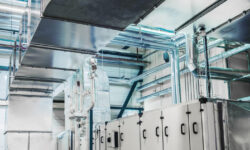Anyone who owns a commercial building knows that ductwork is an integral part of the property’s operations. In order to operate at maximum efficiency, your HVAC ductwork needs to be designed, sized, and installed correctly. Proper duct size is all too often an overlooked feature of commercial HVAC systems. The role that duct sizing and material play in maintaining a safe, comfortable environment should not be underestimated. Having the right size and material for your ducts will maintain comfortable conditions, improve indoor air quality, minimize energy losses, and lower your heating and cooling bills, as well.
Read more →Regular HVAC maintenance in your commercial building is a responsibility you owe to your tenants and employees, but you owe it to yourself, as well. In fact, properly maintained systems can provide up to 25 years of dependable performance. Commercial-grade HVAC equipment such as air conditioners, furnaces, heat pumps, and boilers are very expensive to replace. On the other hand, regular preventative maintenance is relatively inexpensive. From reducing utility costs to improving your air quality, professional HVAC maintenance is financially advantageous and time-saving.
Read more →Heating, ventilation, and air conditioning (HVAC) systems are so commonly used in American commercial buildings, schools, data centers, homes, and other places that you probably don’t notice them unless the setting is too cold or the system breaks. You’ve probably never given much thought to the history of HVAC installations! Whether you notice HVAC systems or not, Americans spend vast sums on them. The Energy Information Administration reported in 2015 that 48 percent of energy consumption was related to heating and cooling costs! Though HVAC systems are everywhere, how much do you know about their history?
Read more →Air handling units (AHU) are used in medium- and large-sized industrial or commercial properties to condition and distribute fresh air throughout the building. An AHU is part of the larger HVAC system (heating, ventilating, and air conditioning). The device takes air from the outdoors, cleans and conditions it, and heats or cools it as needed. Read on to learn more.
Read more →As stated by the CDC, HVAC systems can be a big source of indoor pollutants. Improperly maintained systems can lead to the introduction of microbes into an indoor air system. Improper operation and maintenance of HVAC systems can seriously impact a building’s indoor environmental quality (IEQ) and be the cause of other detrimental issues. A Severn Group service contract is a cost-efficient, convenient way to ensure a building’s HVAC system is properly maintained. The following five reasons explain why a service contract is the right choice.
Read more →According to the EPA, heating and cooling systems account for 40%-50% of the energy consumption in the typical hotel room. The type of HVAC system you choose for your hotel rooms will not only affect your energy bills but also contribute significantly to the comfort of your guests.
Read more →Heating, Ventilating, and Air-Conditioning (HVAC) systems are what we know. HVAC systems control the temperature, air quality, and humidity in buildings large and small. Yet, not all HVAC systems are the same, especially when it comes to commercial buildings. That is why we want to talk about the basics. Things you need to know to help you understand the complexity behind commercial HVAC systems. While it might seem as simple as keeping the indoors cool in the summer and warm in the winter, there is so much more to it. So, let’s talk about understanding commercial buildings’ HVAC systems.
Read more →Air handlers work with an air conditioning unit and/or heat pump to circulate air. They help make the system more energy-efficient and generally come in a large rooftop unit. Although, there are different areas in which you may find an air handling unit. It contains a blower, filter racks, cooling or heating elements, dampers, and sound attenuators. Air handlers also connect to the building’s ductwork ventilation system. There are a lot of misconceptions and basic information you need to know about an air handler. Here are the top five important things to know.
Read more →In 2015, chilled beam technology was projected to grow nearly double by 2020. Now projections are showing the U.S. will contribute around 28% in chilled beam system demands by 2026. This is largely due to energy efficiency regulations in North America. Currently building energy consumption is about 40% of the total energy consumption in the U.S. As a push toward lower carbon emissions continues to grow, it stands to reason so will technologies that reduce energy consumption. Chilled beams offer major benefits in energy efficiency.
Read more →When choosing an HVAC system for your business or facility, you have plenty of options. If you’re deciding between a heat pump or an air conditioner, there are a few things to consider. Both use compressed refrigerants to collect heat from your indoor space and transfer it outside. However, which system is more beneficial to your specific building? To find out, it’s important to know the difference between the two.
Read more →









